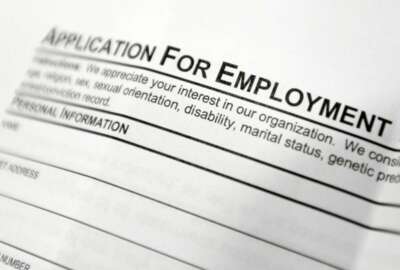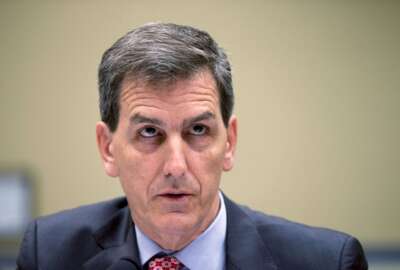One thing about the Biden administration that’s pretty stable
Relative to other recent presidents, White House staff turnover during the Biden administration has been low. Turnover reached 35% 2022 and dropped to 23% last...
Relative to other recent presidents, White House staff turnover during the Biden administration has been low. Turnover reached 35% 2022 and dropped to 23% last year. With some thoughts and perspective, the Federal Drive with Tom Temin talked with the observer who came up with those numbers: Katie Tenpas, senior fellow in governance studies at Brookings.
Interview Transcript:
Tom Temin And just begin a couple of definitions. One, when you talk about white House staff turnover, which staff are you counting in this. Who’s included.
Katie Tenpas Yeah. No that’s a terrific question. It’s very difficult to get a comprehensive list of White House staff. So, what I’ve done is adopted the National Journal’s definition. They created an edition at the start of each new administration called Decision Makers. And for the first six months in the Biden administration, they assigned several reporters to go around Washington, D.C., to try to figure out who the most influential staff members would be. They published this from Ronald Reagan through Obama, and then they stopped with Donald Trump. A reporter called me and asked me if I was continuing to study White House staff turnover. And I said, oh, I can’t do it anymore because the National Journal is no longer publishing decision makers. And she said, well, I think there’s a way why don’t we pair up? And so, the two of us, Madison Alder and I paired up and we basically tried to replicate what the National Journal had done in those prior editions. So, I studied something called the A-Team. And in the case of Biden, the A-Team is 66 individuals that I have carefully identified as being the most influential staff members. So, I’m only looking at sort of the very top tier, including assistants to the presidents, the, you know, the director of the National Economic Council, the very senior positions in the executive office of the president. And the way I define turnover is any movement within a position. So, let’s say somebody moves from deputy chief of staff to chief of staff. Well, they’re still in the white House, but it does create a vacancy. I count that as turnover, because it does mean that the white House will then have to fill that position of deputy chief of staff. So even though there is staff continuity and a promotion, it still creates a disruption. And that’s what I’m really trying to identify. So, I start with a sample in the case of Biden of 66, and I monitor those departures or those movements. And then I look year to year, how many people have departed? And I now have data going all the way back to Reagan. So, I can kind of show you objectively where presidents stand in terms of white House staff stability.
Tom Temin Is the press secretary among those?
Katie Tenpas Yes. Jen Psaki was in the sample. She’s no longer in the sample. Once you fall out, you fall out.
Tom Temin No, but what I mean is this could point to the reason for following these kinds of things, because she was pretty good at parrying with the press. The young lady that came after seems to struggle, you know, a bit with dealing with these things. And so turnover can affect performance. Fair to say.
Katie Tenpas It can affect performance for a lot of reasons. I think at the beginning of each new administration you really are getting the first string. You are getting the people that the incoming president knows the best to probably work with them the longest, who they deem to be the most talented and best suited for specific positions. And as an administration ages, then you’re moving to the second string and then you’re moving to the third string. So, you’re right that the talent pool changes over time. And I think that there are just some jobs like press secretary, where the burnout level is extraordinarily high. I mean, the pressure on those individuals is ridiculous. And so, you are going to have turnover. So, you do need to be prepared to have deputies. And not everybody is going to be successful as their predecessor. I would say the other thing that’s bad about turnover is that when someone departs, the successor has to learn in real time. You know, when you work in the White House, you have four years, and the clock is ticking constantly. So, any time that you set aside to sort of study up and try to figure out a job, it’s real time. You know, you’re wasting those days or those months that are ticking away and that will no longer exist unless you get reelected.
Tom Temin Did you track it during the Trump administration? I think you were on during that. But that was kind of like, you know, Dorothy saying, my people certainly come and go around here.
Katie Tenpas So I have to say that the Trump administration was what put my research on the map. I had been studying White House staff turnover since the late 90s. I originally got onto this whole topic because my dissertation for my PhD was, how do presidents simultaneously run the government and run for reelection? And I realized that in examining the different reelection campaigns, there seemed to be a lot of staff turnover in year three, where senior staff members would go work for the reelection campaign. And then that just sort of got me down the rabbit hole. I thought, you know, this is really interesting. These jobs are some of the most influential jobs in our government. And for many people, this is the job of a lifetime to get to work for a president, to get to work for the White House. And I was noticing I was like, why is it that people are leaving after 18 months or 24 months? I mean, you’d think if you had this opportunity, you would stay until it ended. So that’s kind of what got me going. I just became very curious. And then I did a lot of research looking at the private sector and how they spend millions of dollars on retention efforts. How do we retain the best and the brightest? So, I thought. This is really anomalous. We have, you know, the most influential positions in our government because president’s portfolio is large, that they have to rely on these people, and these people are unelected, and they have all of this influence. Why would you give up a job like that? So that kind of led me down the rabbit hole. And then I’ve been working with the Miller Center at UVA, and they do a lot of oral histories. So, I’ve been able to ask questions of a lot of former White House staffers to try to learn more about it.
Tom Temin We’re speaking with Katie Tenpas. She is nonresident senior fellow in governance studies at Brookings. Let’s get to the Biden administration. You found that there’s plenty of turnover, but it’s only middling in terms of how it ranks compared with the other seven presidents you’ve looked at.
Katie Tenpas Right. If you look at the White House staff turnover amidst the A-Team, President Biden comes in fourth. He ranks behind George H.W. Bush, who came in at 57% turnover after three years. And President Clinton and President George W Bush both had 58% turnover after three years. And President Biden has 65% turnover after three years in office. So, he’s fourth. Obviously, we had an outlier that made White House staffing interesting. That was President Trump. And his turnover after three years was almost 20 points higher at 83%.
Tom Temin So almost complete turnover of the people around him.
Katie Tenpas Yes. Of the most senior people. Right. And you know, I think that like I said before, stability is important to performance. I am usually reluctant to compare the private sector to the government. But in the case of turnover, all the disruption that occurs in the private sector also occurs in the White House. So, anybody can relate to the fact of when their boss leaves or the head of an office leaves, it creates a lot of anxiety. It Inhibits your ability to do any sort of long-term planning. And so, I think that it’s important that presidents, you know, when they ask these individuals to work for them in their administration, that they stay as long as they can, provided that their performance is good. You know, presidents should have the capacity to ask people to leave at any moment.
Tom Temin Sure. And the fact that people do leave before the end of the four years, much less the eight years, I’m not sure anyone can survive eight years. Part of the issue is just the hours, right? I mean, it is not a 9 to 5 Monday through Friday situation if you’re on that so-called A-Team.
Katie Tenpas Absolutely not. Yes, you’re probably working 70 80 hours regularly, if not more. Lots of travel in some cases. And I argue that what we saw in year three, unlike year two, was the departure of the creme de la creme, like the very senior senior, and that within the A-Team. And part of the reason, I contend, is that many of these people were actually in year five. They weren’t in year three because they had worked on the campaign. So, you think about the campaign hours. They had a pretty rocky transition because there was so much uncertainty. And then they started the administration. So many people were on year five instead of year three.
Tom Temin And who are some of the notables that have left in year three? Let’s put some names here.
Katie Tenpas That’s a great question. Chief of staff Ron Klain, probably the most influential individual who left. But then you also had the domestic policy advisor, Susan Rice. You had the director of the National Economic Council, Brian Deese. You had the legislative director, Louisa Tyrrell, who was thought to be quite successful in getting Biden legislation, infrastructure bills, other bills passed. You had the communications director, Kate Bedingfield, who had been with Biden through the campaign, and then you had the director of intergovernmental affairs, Julia Rodriguez. You also had two positions that I would actually say were even more influential. And the reason why is because they required Senate confirmation. And one of those was National Cyber Director Chris Inglis, and the other was a chair of the Council of Economic Advisers, Cecilia Rouse, who is now the president of Brookings, I should add. But those, I think, in many ways are the most consequential, because you may have noticed how much trouble and how difficult it is to get the president’s appointees through the confirmation process. President Biden is having a lot of success getting the judicial nominees through the nomination process. But when it comes to the individuals that are serving in the executive departments getting those appointees through, it’s been much slower.
Tom Temin And it’s a peripheral issue. But then if you look at the cabinet appointees, I think that’s been almost totally stable so far in the Biden administration.
Katie Tenpas So if you separate the A-Team within the executive office of the president and look only at the president’s cabinet, and I define the president’s cabinet as the 15 positions in the line of presidential succession, ever since President Eisenhower, presidents have done this thing where they take certain positions like the UN ambassador, and they make that what they call cabinet level. And so, in an effort to get people to take jobs or in an effort to make them feel better about their position, they elevate a position to the cabinet level. But it’s not in the line of presidential succession. It can change from president to president. It can even change within a presidency, as it did for Nikki Haley’s position during Trump. And so, I really think the best way to examine cabinet turnover is to always compare apples to apples is to only look at the positions in the line of presidential succession. And President Biden has only lost one cabinet member and it was the labor secretary. And when you study the cabinet, oftentimes a simple way of teaching it is to say there’s the inner cabinet. Which is State, Justice, Treasury and Defense. And then we have the outer cabinet that tends to be more constituency related, like Veterans Affairs or Labor or Education. So, he lost one individual, and the one individual is actually in the outer cabinet as opposed to the inner cabinet. So, in many ways it’s even less of a loss.
Tom Temin Right. And Marty Walsh went from one place where people bang into each other, like the White House, into another one, which is the National Hockey League. So, I guess, yes, there’s something of a pattern in there. But to sum it all up, though, it’s probably fair to say it really is lonely at the top.
Katie Tenpas Being a cabinet secretary or being a president. Being a.
Tom Temin President.
Katie Tenpas Yeah, I would yeah, aggressively. But you know, in the case of President Biden, I would say it is different in the sense that he’s been in politics for so many years. He has all of these close advisors like Steve Ricchetti and Mike Donlon. And I just feel like he knows people better. And he was Vice President. So, he really has a sense, you know, talk about preparation for the job, like you really know what you’re expecting. Unlike, you know, President Obama, who had only been a senator and then became president. I think in the case of President Biden, there might be a whole lot less loneliness. And just to get back to the cabinet turnover, you know, President Biden has only lost one cabinet secretary. And comparatively, at the same time in office, President Trump had lost ten of his cabinet secretaries after three years. I mean, that is just a striking difference.
Tom Temin Yes. And ultimately, then whatever policy objectives you have or that much less attainable when there’s all this turnover.
Katie Tenpas Exactly.
Tom Temin Well, you need steadiness to drive the policy down through the bureaucracy. That just doesn’t happen automatically.
Katie Tenpas That’s right. That’s exactly right.
Copyright © 2024 Federal News Network. All rights reserved. This website is not intended for users located within the European Economic Area.
Tom Temin is host of the Federal Drive and has been providing insight on federal technology and management issues for more than 30 years.
Follow @tteminWFED






